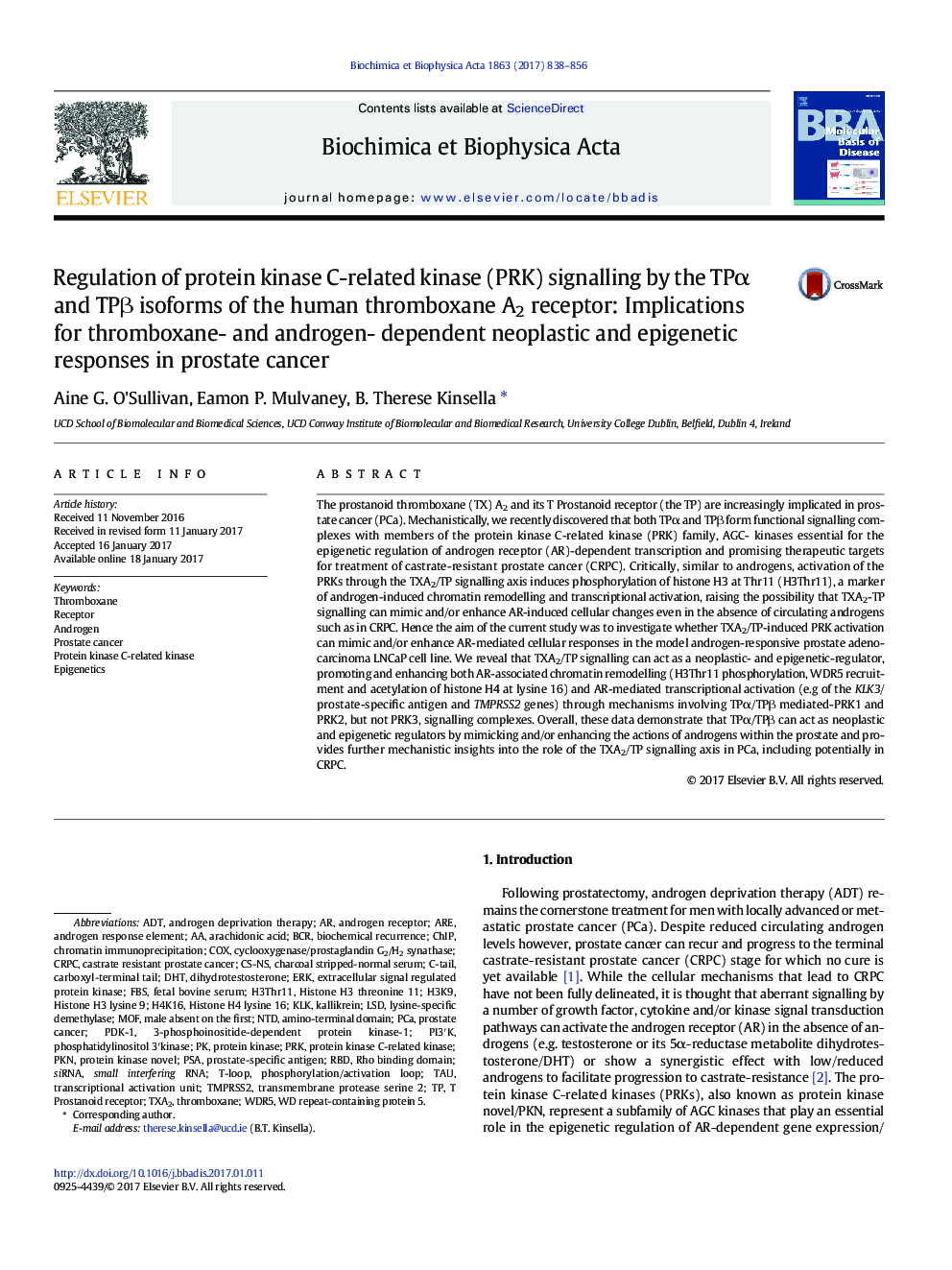| Article ID | Journal | Published Year | Pages | File Type |
|---|---|---|---|---|
| 5500965 | Biochimica et Biophysica Acta (BBA) - Molecular Basis of Disease | 2017 | 19 Pages |
Abstract
The prostanoid thromboxane (TX) A2 and its T Prostanoid receptor (the TP) are increasingly implicated in prostate cancer (PCa). Mechanistically, we recently discovered that both TPα and TPβ form functional signalling complexes with members of the protein kinase C-related kinase (PRK) family, AGC- kinases essential for the epigenetic regulation of androgen receptor (AR)-dependent transcription and promising therapeutic targets for treatment of castrate-resistant prostate cancer (CRPC). Critically, similar to androgens, activation of the PRKs through the TXA2/TP signalling axis induces phosphorylation of histone H3 at Thr11 (H3Thr11), a marker of androgen-induced chromatin remodelling and transcriptional activation, raising the possibility that TXA2-TP signalling can mimic and/or enhance AR-induced cellular changes even in the absence of circulating androgens such as in CRPC. Hence the aim of the current study was to investigate whether TXA2/TP-induced PRK activation can mimic and/or enhance AR-mediated cellular responses in the model androgen-responsive prostate adenocarcinoma LNCaP cell line. We reveal that TXA2/TP signalling can act as a neoplastic- and epigenetic-regulator, promoting and enhancing both AR-associated chromatin remodelling (H3Thr11 phosphorylation, WDR5 recruitment and acetylation of histone H4 at lysine 16) and AR-mediated transcriptional activation (e.g of the KLK3/prostate-specific antigen and TMPRSS2 genes) through mechanisms involving TPα/TPβ mediated-PRK1 and PRK2, but not PRK3, signalling complexes. Overall, these data demonstrate that TPα/TPβ can act as neoplastic and epigenetic regulators by mimicking and/or enhancing the actions of androgens within the prostate and provides further mechanistic insights into the role of the TXA2/TP signalling axis in PCa, including potentially in CRPC.
Keywords
PDK-1RBDKallikreinNTDTxA2PRKCRPCWDR5H3K9ADTKLKPKNLysine-specific demethylaseTMPRSS2T-loophistone H3 lysine 9C-tailERKDHTCOXFBSLSDBCRMOFPSAPCASmall interfering RNAsiRNAAndrogenArachidonic acidEpigeneticschromatin immunoprecipitationthromboxaneTauamino-terminal domainADT, Androgen deprivation therapycarboxyl-terminal tailDihydrotestosteroneRho binding domainProstate cancercastrate resistant prostate cancerfetal bovine serumextracellular signal regulated protein kinaseandrogen response elementBiochemical recurrenceARE3-phosphoinositide-dependent protein kinase-1prostate-specific antigentransmembrane protease serine 2Protein kinaseCHiPReceptorAndrogen Receptor
Related Topics
Life Sciences
Biochemistry, Genetics and Molecular Biology
Ageing
Authors
Aine G. O'Sullivan, Eamon P. Mulvaney, B. Therese Kinsella,
